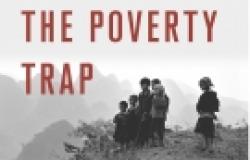Book Review - A review of How China Escaped the Poverty Trap

How China Escaped the Poverty Trap by Yuen Yuen Ang. 2016. Cornell University Press, Cornell Studies in Political Economy.
We chose to highlight this book for the World Development Report (WDR) 2017 Seminar Series as its focus on institutional functions rather than forms and on adaptation resonates strongly with the upcoming WDR 2017.
The first takeaway of the book, that a poor country can harness the institutions they have and get development going is a liberating message. Nations don’t have to be stuck in the “poor economies and weak institutions” trap. This provocative message challenges our prevailing practice of assessing a country’s institutions by their distance from the global best practice and ranking them on international league tables. Yuen Yuen’s work, in contrast, highlights the possibility of using existing institutions to generate inclusive growth and further impetus for institutional evolution.
The 2017 World Development Report on Governance and the Law highlights three institutional functions that are essential for policy effectiveness: making credible commitments, inducing cooperation, and coordinating beliefs and complementary actions. At the early stages of development, these functions are likely performed by informal institutions.
As the author illustrates, at the beginning of Chinese reform, the commitment not to expropriate investment wasn’t backed by strong legal institutions; it was based on personal relationship and trust between the investors and their local hosts. The cooperation of a massive number of cadre members with the investment promotion campaign was achieved through strong performance management.
We need to engage more with research of this nature. Instead of inconveniently writing off outlier cases such as China, Vietnam, Rwanda, Bangladesh or Cambodia, we should instead unpack how they evolved institutional solutions to commitment, cooperation and coordination problems as their economies evolved. And the types of growth that are more likely to generate the diverse and balanced interests that may give impetus to developing the strong institutions essential for preserving markets. The second part of the book is equally thought provoking. While adaptive approaches to development have become new buzzwords, Yuen Yuen’s work brings rigor to this conversation. For a society to adapt to ever evolving challenges, she argues that its meta-institutions need to empower local agents to experiment with strategies, have a process of selection for the superior strategies to win, and create niche and complementarity to leverage heterogeneity.
The second part of the book is equally thought provoking. While adaptive approaches to development have become new buzzwords, Yuen Yuen’s work brings rigor to this conversation. For a society to adapt to ever evolving challenges, she argues that its meta-institutions need to empower local agents to experiment with strategies, have a process of selection for the superior strategies to win, and create niche and complementarity to leverage heterogeneity.
She unpacks in detail the specific mechanisms at play in the Chinese case, namely unambiguous goals the central government sets and communicates; a highly decentralized system where local government officials have a fair degree of autonomy to choose their strategies; and the high-power incentive provided by the cadre performance management system and finally profit sharing. Her analysis of the functions of the party slogans and guidelines of varying degrees of ambiguity is equally fascinating.
The lens Yuen Yuen uses to understand the China story is unique and powerful. And its value goes far beyond enlightening the China story. It points to the value of decentralized governance in generating strategy variations and the importance of a strong party to coordinate actions. The WDR2017 also gives decentralized governance a spotlight. The argument for decentralized governance is not that all local governments will be developmentally oriented with low corruption. In fact, we should expect a lot of variations. The main argument for decentralized governance is that it creates opportunities for competent individuals to pursue political leadership, for societal groups to invest in building political parties, or for existing subnational governments to adopt innovative policy solutions. But for decentralized governance to actually provide the incentive for developmental performance, subnational governments need clear and substantive responsibilities and need to be held accountable, either by their citizens or by higher levels of government.
It is hard to resist the temptation to use a “Yuen Yuen” lens to speculate what could have happened and what will happen in China. Its single-minded drive towards growth has come with a cost. Air and water pollution has become unbearable in many parts of the country. The prebendalism that provided the strong incentive for officials to support growth seems to have run amok. Some argue that China only belatedly started addressing the environmental problems and corruption problems. What modification in its meta institutions would have allowed faster adaptation? Are the current meta institutions sufficient to address the problem? What forces will push for the next phase of institutional evolution?
I would suggest an additional dimension to Yuen Yuen’s framework, namely the contestability of the policy arena. In the case of China, can the policy contestation process become more open, so the tradeoffs of the development model can be fully informed by feedback from the stakeholders and debated? Can the center decentralize more goal setting and accountability to local jurisdictions, so the diverse preferences and interests represented in each local jurisdiction can influence local policy directions?
As Yuen Yuen shows, in response to the multi-dimensional challenges, the national guidelines on evaluation of local leaders have become multi-dimensional and include performance areas that are not easily measurable. The “directed improvisation model” has its limits. It will need to evolve into a model where local goals and policy directions are influenced by local stakeholders, and local leaders are held more accountable by the local population. A crackdown without strong checks and balance will not create sustainable reduction of corruption. What forces will generate the impetus for the development of much needed institutions with checks and balance? As Yuen Yuen concludes her book, we bear witness to this critical juncture that China confronts.
I hope the second takeaway is that we need to think more carefully about the source of adaptability. What is the nature of the contestation process around the setting of the goals? How do we make sure minority interests are not entirely ignored? How do we accommodate new actors and demands that emerge out of the development process? How can gridlocks be resolved? How do we stimulate a dynamic implementation process? How do we empower local actors to experiment and innovate? What selection mechanisms are at play for superior strategies to win democratic elections or bureaucratic performance management? It seems that this analytical lens has enormous potential for thinking through the adaptive challenge, whether at the national level, subnational level or sectoral level.
Click here for the presentation and video of the book talk at the World Bank.
Yongmei Zhou is a co-Director of the World Development Report on Governance and the Law. She received her PhD in Economics from the University of California at Berkeley before joining the World Bank as a Young Professional in 1999. She has extensive operational experience with governance reform and institutional development in Africa, South Asia and the fragile and conflict-affected states. Her research has focused on the issues of corruption, legislature, decentralization, and service delivery. She also played leadership role as the Manager of the Fragility, Conflict and Violence Group, which advocated for a wide range ofcorporate reforms and provided technical assistance to country teams in fragile and conflict-affected states. The review first appeared on the World Bank Development Blog, on Jan 13, 2017.


